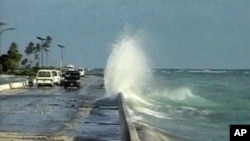What happens to a nation’s sovereignty if it literally sinks beneath the ocean? This is among the unprecedented questions facing many of the world’s island nations now threatened by rising sea levels. Legal scholars, diplomats and other experts wrestled with this scenario this week at the Columbia University Law School in New York City.
Sea levels in recent decades have been rising each year by millimeters and now threaten to increase by centimeters and even more. It could be enough to submerge many island nations.
Columbia University’s “Threatened Island Nations Conference” examined the legal implications of global climate change and the resulting rise in sea levels. The easy part was recognizing that sovereignty confers citizenship, diplomatic status, mineral rights, and other privileges of nationhood.
But Rosemary Rayfuse, a law professor at Australia’s University of New South Wales said the next part is more difficult. “We have rules about the creation of states that we alluded to this morning, but we don’t have any rules about states, which physically disappear off the face of the earth,” she said.
So if an island nation is submerged beneath the ocean, does it maintain its membership in the United Nations? Who is responsible for the citizens? Do they travel on its passport? Who claims and enforces offshore mineral and fishing rights in waters around a submerged nation?
International law currently has no answers to such questions.
United Nations Ambassador Phillip Muller of the Marshall Islands said there is no sense of urgency to find not only those answers, but also to address the causes of climate change, which many believe to be responsible for rising ocean levels.
“Even if we reach a legal agreement sometime soon, which I don’t think we will, the major players are not in the process,” Muller said.
Those players, the participants said, include industrial nations such as the United States and China that emit the most carbon dioxide and other so-called greenhouse gases. Many climate scientists say those gases are responsible for global warming. Mary-Elena Carr of Columbia University’s Earth Institute said what is now an annual sea level rise of a few millimeters will increase dramatically by the year 2100.
“There’s just no escaping one meter by 2100. No escaping that. Could it be more? Absolutely. Is it likely to be 10? No,” she said.
The reason, she says, are industrial greenhouse gases that trap heat in the upper atmosphere. Higher global temperatures then cause glaciers to melt and sea levels to rise. And higher sea levels would submerge many island nations.
Jenny Grote Stoutenburg, a legal scholar at the University of California, pointed out it is difficult to prove responsibility for climate change. “But even if a legal duty of continued recognition cannot be established, states should accept moral responsibility for their disproportionate use of the atmosphere and continue recognizing island states out of a sense of international justice and solidarity,” she said.
Ambassador Antonio Lima of the Cape Verde Islands warned that if people in large nations do not help those on small threatened islands, they will condemn themselves to the same fate. “We are the sentinels of the world, the small island developing states. We are sentinels of the world. What is happening to us will happen to all of us tomorrow,” he said.
Indeed, scientists predict that because of rising sea levels, people living in coastal areas of large nations will face the same threat of inundation now being faced by residents of small island nations.
The Columbia conference did not answer the questions it posed. But it did issue a moral challenge to the international community to take measures to protect island nations from being submerged. As Ambassador Lima put it, human civilization means solidarity, not abandoning others to their fate. And time to avert that fate, he said, is running out.
News
Rising Sea Levels Threaten Island Nations




